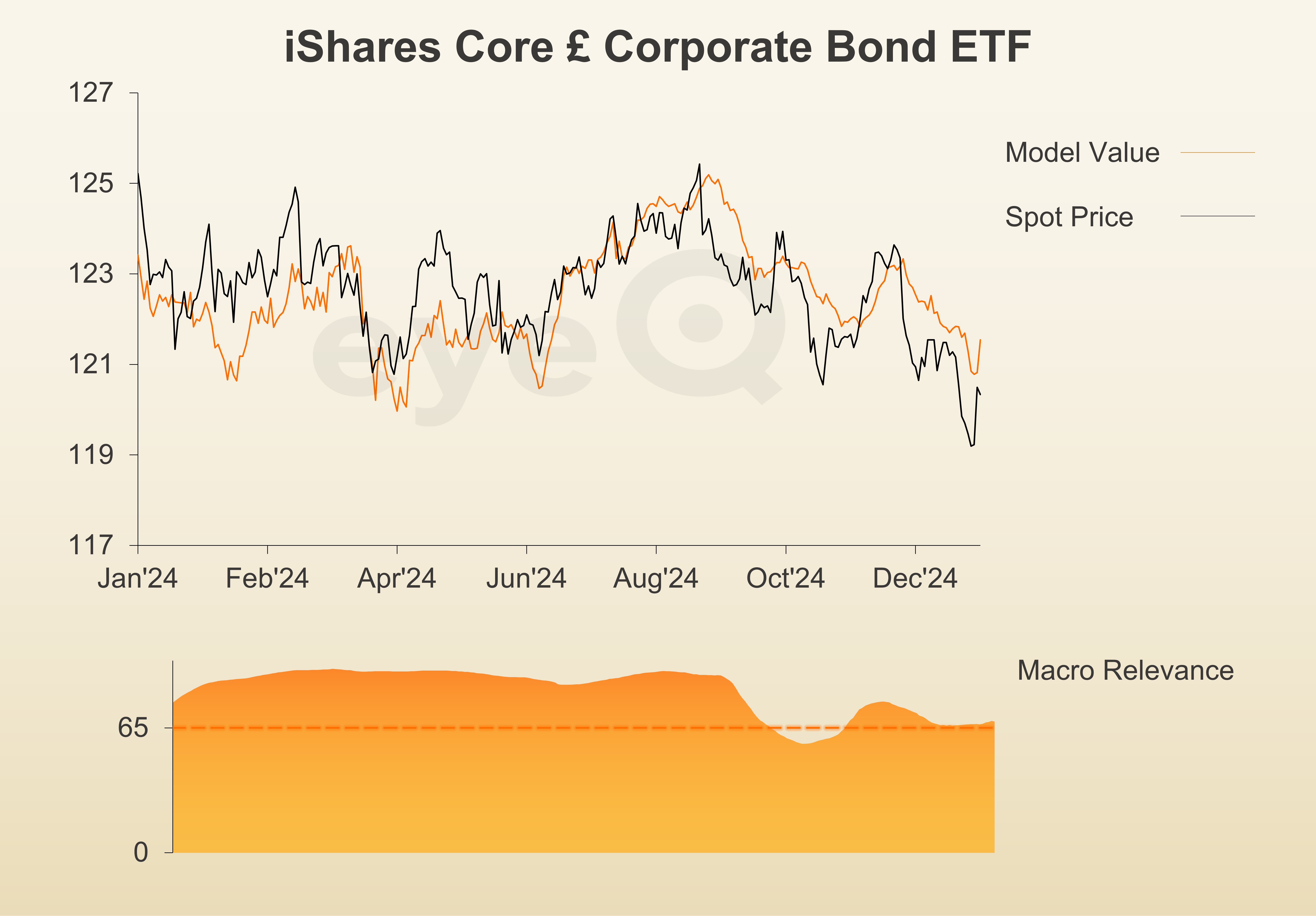eyeQ: a bullish signal on this ETF
Experts at eyeQ have used AI and their own smart machine to analyse macro conditions and generate actionable trading signals. Here, it examines a fund offering exposure to sterling corporate bonds.
16th January 2025 12:14
by Huw Roberts from eyeQ

"Our signals are crafted through macro-valuation, trend analysis, and meticulous back-testing. This combination ensures a comprehensive evaluation of an asset's value, market conditions, and historical performance." eyeQ
- Discover: eyeQ analysis explained | eyeQ: our smart machine in action | Glossary
iShares Core £ Corporate Bond ETF (SLXX)
Macro Relevance: 68%
Model Value: 121.54
Fair Value Gap: -1.01% discount to model value
Data correct as at 16 January 2025. Please click glossary for explanation of terms. Long-term strategic model.
iShares Core £ Corp Bond ETF GBP Dist (LSE:SLXX) is an exchange-traded fund (ETF) on the ii platform that gives investors exposure to sterling corporate bonds. It tracks liquid investment-grade credit.
A corporate bond is simply when companies such as Barclays and EDF issue debt rather than equity. Ratings agencies such as Moody’s or Standard & Poor’s assign a credit rating to give investors a sense of how risky each bond is. Investment grade means the credit quality is good. The ETF also screens to include the most-liquid corporate bonds to try and keep trading costs down.
On eyeQ, SLXX is now 1.0% cheap, which is enough to trigger a bullish signal. During last week's turmoil in the UK bond market, the ETF was actually cheaper - it hit 1.7% cheap to overall macro conditions - but there was no signal. The difference now is model value has stopped falling and turned higher.
Over Q4, the orange line in the chart below trended lower - macro conditions for UK credit were deteriorating. This week, it has bounced, so there are fledgling signs that the recent turmoil for the UK credit market is abating.
Personal risk tolerance is critical here. Our recent video investigated what's driven the back-up in gilt yields in January and concludes that while much of the move is due to international rather than domestic factors, there are concerns about the UK growth outlook and deficit picture. That means UK bonds remain vulnerable to future ructions in global markets.
But, if you think this week's softer-than-expected prints in both UK and US inflation data can reinvigorate risk appetite and entice investors to take advantage of the higher yields on offer, then this is an interesting tactical signal.

Source: eyeQ. Past performance is not a guide to future performance.
Useful terminology:
Model value
Where our smart machine calculates that any stock market index, single stock or exchange-traded fund (ETF) should be priced (the fair value) given the overall macroeconomic environment.
Model (macro) relevance
How confident we are in the model value. The higher the number the better! Above 65% means the macro environment is critical, so any valuation signals carry strong weight. Below 65%, we deem that something other than macro is driving the price.
Fair Value Gap (FVG)
The difference between our model value (fair value) and where the price currently is. A positive Fair Value Gap means the security is above the model value, which we refer to as “rich”. A negative FVG means that it's cheap. The bigger the FVG, the bigger the dislocation and therefore a better entry level for trades.
Long Term model
This model looks at share prices over the last 12 months, captures the company’s relationship with growth, inflation, currency shifts, central bank policy etc and calculates our key results - model value, model relevance, Fair Value Gap.
These third-party research articles are provided by eyeQ (Quant Insight). interactive investor does not make any representation as to the completeness, accuracy or timeliness of the information provided, nor do we accept any liability for any losses, costs, liabilities or expenses that may arise directly or indirectly from your use of, or reliance on, the information (except where we have acted negligently, fraudulently or in wilful default in relation to the production or distribution of the information).
The value of your investments may go down as well as up. You may not get back all the money that you invest.
Equity research is provided for information purposes only. Neither eyeQ (Quant Insight) nor interactive investor have considered your personal circumstances, and the information provided should not be considered a personal recommendation. If you are in any doubt as to the action you should take, please consult an authorised financial adviser.
Disclosure
We use a combination of fundamental and technical analysis in forming our view as to the valuation and prospects of an investment. Where relevant we have set out those particular matters we think are important in the above article, but further detail can be found here.
Please note that our article on this investment should not be considered to be a regular publication.
Details of all recommendations issued by ii during the previous 12-month period can be found here.
ii adheres to a strict code of conduct. Contributors may hold shares or have other interests in companies included in these portfolios, which could create a conflict of interests. Contributors intending to write about any financial instruments in which they have an interest are required to disclose such interest to ii and in the article itself. ii will at all times consider whether such interest impairs the objectivity of the recommendation.
In addition, individuals involved in the production of investment articles are subject to a personal account dealing restriction, which prevents them from placing a transaction in the specified instrument(s) for a period before and for five working days after such publication. This is to avoid personal interests conflicting with the interests of the recipients of those investment articles.